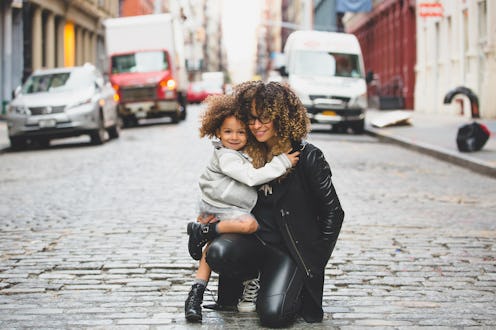Unfortunately, our society frequently teaches women to feel bad about their bodies. Expressing these negative feelings is 100 percent valid — but we have to be really careful about how we express them around children, and Real Simple's "What your daughter hears when you criticize yourself" video demonstrates exactly why. In it, little girls recite comments that women commonly make about their bodies. It really gets you thinking about how such statements might affect young people.
The actors in the video say things that women commonly say about their own bodies, like "I could never wear a dress without Spanx" and "I'm so bad, I ate a cupcake today." When you see children saying these things, you realize how cruel and undeserved they are. That's true when we're saying them to ourselves, but they're especially problematic around kids, since they're picking up so many messages from us.
At the end, the girls say things they'd like to hear instead, like "You're beautiful even if you don't think that you're beautiful," "They're beautiful inside out, it doesn't matter what you look like," and "There's no such thing as ugly... everybody's beautiful."
"Be kind to yourself," text at the end reads. "Your daughters are listening."
How we speak to kids really does influence them. First graders in one University of Lethbridge study who learned positive affirmations thought more positively by the end of the year. And when it comes to body image, it's really important to start young. By the time they're 10 years old, 80 percent of girls have already been on a diet.
As an eating disorder survivor, I can attest to the fact that hearing others make body-negative comments can hurt your own body image. I remember my mom complaining about how, if she wants to fit into a dress, she shouldn't be eating the fries we both just ate — which made me wonder if I should've passed on them, too. I also remember a friend who was skinnier than me saying that she can't wear a bikini or else she'll look pregnant, which led me to wonder how "pregnant" I must look.
We don't want to tone-police women by telling them to only say positive things about their bodies, but there's a difference between acknowledging that you have body image issues and acting as if your poor body image reflects reality. I myself have made the mistake of calling myself fat around people with different body shapes than me, which implies that a) fat is a bad thing and b) their bodies are bad, too. (Neither of those things is true.) So, instead, I try to just say that I'm struggling with body image. It conveys what I need to without putting myself or anyone else down.
And when I'm speaking to myself, I try to imagine how it would feel to say the same things to my younger self. Another video addresses this more directly: Rachel Levin's "I Am Ugly." When Levin says the critical things she tells herself to her younger self, she suddenly feels bad about it.
There's something about directing a statement toward a child that exposes how wrong it is. Maybe it's because we're more careful about how we speak to children than we are to adults, especially ourselves. Maybe it's because kids are so innocent that we feel they don't deserve negativity. But neither do any of us.
The way we speak to kids should set the standard for how we speak to everyone. Our words send powerful messages both to the people around us and to ourselves.
